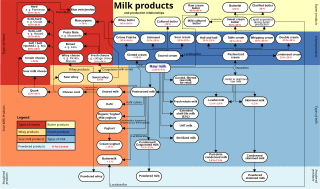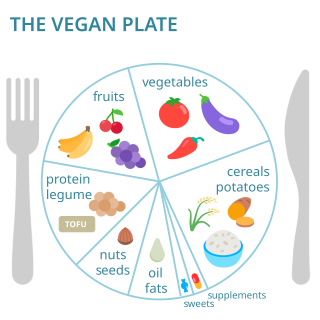Related Research Articles

Dairy products or milk products, also known as lacticinia, are food products made from milk. The most common dairy animals are cow, water buffalo, nanny goat, and ewe. Dairy products include common grocery store food around the world such as yogurt, cheese, milk and butter. A facility that produces dairy products is a dairy. Dairy products are consumed worldwide to varying degrees. Some people avoid some or all dairy products because of lactose intolerance, veganism, environmental concerns, other health reasons or beliefs.
Veganism is the practice of abstaining from the use of animal products—particularly in diet—and an associated philosophy that rejects the commodity status of animals. A person who follows the diet or philosophy is known as a vegan.

Vegetarianism is the practice of abstaining from the consumption of meat. It may also include abstaining from eating all by-products of animal slaughter.

A fad diet is a diet that is popular, generally only for a short time, similar to fads in fashion, without being a standard scientific dietary recommendation, and often making unreasonable claims for fast weight loss or health improvements; as such it is often considered a type of pseudoscientific diet. Fad diets are usually not supported by clinical research and their health recommendations are not peer-reviewed, thus they often make unsubstantiated statements about health and disease.

Low-carbohydrate diets restrict carbohydrate consumption relative to the average diet. Foods high in carbohydrates are limited, and replaced with foods containing a higher percentage of fat and protein, as well as low carbohydrate foods.

The Mediterranean diet is a diet inspired by the eating habits and traditional food typical of southern Spain, southern Italy, and Crete, and formulated in the early 1960s. It is distinct from Mediterranean cuisine, which covers the actual cuisines of the Mediterranean countries, and from the Atlantic diet of northwestern Spain and Portugal. While inspired by a specific time and place, the "Mediterranean diet" was later refined based on the results of multiple scientific studies.

In nutrition, diet is the sum of food consumed by a person or other organism. The word diet often implies the use of specific intake of nutrition for health or weight-management reasons. Although humans are omnivores, each culture and each person holds some food preferences or some food taboos. This may be due to personal tastes or ethical reasons. Individual dietary choices may be more or less healthy.

A plant-based diet is a diet consisting mostly or entirely of plant-based foods. Plant-based diets encompass a wide range of dietary patterns that contain low amounts of animal products and high amounts of fiber-rich plant products such as vegetables, fruits, whole grains, legumes, nuts and seeds. They do not need to be vegan or vegetarian, but are defined in terms of low frequency of animal food consumption.

A healthy diet is a diet that maintains or improves overall health. A healthy diet provides the body with essential nutrition: fluid, macronutrients such as protein, micronutrients such as vitamins, and adequate fibre and food energy.

The China Study: The Most Comprehensive Study of Nutrition Ever Conducted and the Startling Implications for Diet, Weight Loss and Long-term Health is a book by T. Colin Campbell and his son, Thomas M. Campbell II. The book argues for health benefits of a whole food plant-based diet. It was first published in the United States in January 2005 and had sold over one million copies as of October 2013, making it one of America's best-selling books about nutrition.
A diabetic diet is a diet that is used by people with diabetes mellitus or high blood sugar to minimize symptoms and dangerous complications of long-term elevations in blood sugar.
The Dietary Approaches to Stop Hypertension or the DASH diet is a diet to control hypertension promoted by the U.S.-based National Heart, Lung, and Blood Institute, part of the National Institutes of Health (NIH), an agency of the United States Department of Health and Human Services. The DASH diet is rich in fruits, vegetables, whole grains, and low-fat dairy foods. It includes meat, fish, poultry, nuts, and beans, and is limited in sugar-sweetened foods and beverages, red meat, and added fats. In addition to its effect on blood pressure, it is designed to be a well-balanced approach to eating for the general public. DASH is recommended by the United States Department of Agriculture (USDA) as a healthy eating plan. The DASH diet is one of three healthy diets recommended in the 2015–20 U.S. Dietary Guidelines, which also include the Mediterranean diet and a vegetarian diet. The American Heart Association (AHA) considers the DASH diet "specific and well-documented across age, sex and ethnically diverse groups."

Vegetarian Diet Pyramid is a nutrition guide that represents a traditional healthy vegetarian diet. Variations of this traditional healthy vegetarian diet exist throughout the world, particularly in parts of North America, Europe, South America and, most notably, Asia. Given these carefully defined parameters, the phrase "Traditional Vegetarian Diet" is used here to represent the healthy traditional ovo-lacto vegetarian diets of these regions and peoples. A pyramid was created by Oldways Preservation Trust in 1998 with scientific research from Cornell and Harvard University and specific reference to the healthy patterns of eating demonstrated by the Mediterranean Diet Pyramid.
Intermittent fasting is any of various meal timing schedules that cycle between voluntary fasting and non-fasting over a given period. Methods of intermittent fasting include alternate-day fasting, periodic fasting, such as the 5:2 diet, and daily time-restricted eating.

Military nutrition is the field and study of food, diet, and nutrition in the military. It generally covers and refers to military rations and nutrition in military organizations and environments.

Michael Herschel Greger is an American physician, author, and professional speaker on public health issues, best known for his advocacy of a whole-food, plant-based diet, and his opposition to animal-derived food products.

Pescetarianism is a dietary practice based on the consumption of fish and shellfish to the exclusion of land-based meats. The practice incorporates seafood into an otherwise vegetarian diet, and may or may not include other animal products such as eggs and dairy products. Approximately 3% of adults worldwide are pescetarian, according to 2017–2018 research conducted by data and analytics companies.

Vegan nutrition refers to the nutritional and human health aspects of vegan diets. A well-planned vegan diet is suitable to meet all recommendations for nutrients in every stage of human life. Vegan diets tend to be higher in dietary fiber, magnesium, folic acid, vitamin C, vitamin E, and phytochemicals; and lower in calories, saturated fat, iron, cholesterol, long-chain omega-3 fatty acids, vitamin D, calcium, zinc, and vitamin B12.

As in the human practice of veganism, vegan dog foods are those formulated with the exclusion of ingredients that contain or were processed with any part of an animal, or any animal byproduct. Vegan dog food may incorporate the use of fruits, vegetables, cereals, legumes including soya, nuts, vegetable oils, as well as any other non-animal based foods.
You Are What You Eat: A Twin Experiment is a 2024 American documentary series set for streaming on Netflix. It is based on an 8-week study conducted by Stanford University that put 22 sets of genetically identical twins on opposing diets: omnivore and vegan. It was released on January 1, 2024.
References
- ↑ Hansen, Jamie (2022). "5 Questions with Dr. Christopher Gardner on tackling food and health disparities while saving the planet". Stanford Center for Innovation in Global Health.
- 1 2 Moskal, Emily (November 30, 2023). "Twin research indicates that a vegan diet improves cardiovascular health" . Retrieved December 2, 2023.
- ↑ "Gardner, C. D. (Christopher David), 1959-". id.loc.gov. Retrieved March 23, 2021.
- 1 2 Doctor, Rebecca (Summer 2019). "Eat Your Vegetables". news.colgate.edu. Retrieved March 23, 2021.
- ↑ "STANFORD RESEARCHERS STUDY GINKGO BILOBA'S EFFECTS ON PERIPHERAL ARTERY DISEASE". med.stanford.edu. July 16, 2002. Retrieved March 23, 2021.
- ↑ "Fresh or capsuled? Stanford researcher studies garlic's potency as a supplement". med.stanford.edu. January 16, 2003. Retrieved March 23, 2021.
- ↑ "Stanford study drives stake through claims that garlic lowers cholesterol levels". med.stanford.edu. February 26, 2007. Retrieved March 23, 2021.
- ↑ Williams, Sarah C.P. (March 7, 2007). "Diet study tips scales toward Atkins low-carb plan". news.stanford.edu. Retrieved March 23, 2021.
- ↑ Gardner, Christopher D.; Trepanowski, John F.; Del Gobbo, Liana C. (2018). "Effect of Low-Fat vs Low-Carbohydrate Diet on 12-Month Weight Loss in Overweight Adults and the Association With Genotype Pattern or Insulin Secretion". JAMA. 319 (7): 667–679. doi: 10.1001/jama.2018.0245 . PMC 5839290 . PMID 29466592. S2CID 205094995.
- 1 2 "Christopher Gardner". cap.stanford.edu. Retrieved March 29, 2021.
- ↑ Putney, Stewart (January 15, 2015). "Connections in Food: Stanford Hosts Fifth Food Summit". ediblesiliconvalley.ediblecommunities.com. Retrieved March 29, 2021.
- ↑ "MENUS OF CHANGE SCIENTIFIC AND TECHNICAL ADVISORY COUNCIL" (PDF). sph.harvard.edu. 2013. p. 49. Retrieved March 29, 2021.
- ↑ "COLLEGE AND UNIVERSITY LEADERS CONVENE TO ADVANCE PLANT-FORWARD MENUS AND A NATIONAL RESEARCH AGENDA FOR FOOD SYSTEMS CHANGE". ciachef.edu. December 22, 2015. Retrieved March 29, 2021.
- ↑ Gardner, Christopher D.; Hartle, Jennifer C.; Garrett, Rachel D.; Offringa, Lisa C.; Wasserman, Arlin S. (April 2019). "Maximizing the intersection of human health and the health of the environment with regard to the amount and type of protein produced and consumed in the United States". Nutrition Reviews. 77 (4): 197–215. doi:10.1093/nutrit/nuy073. PMC 6394758 . PMID 30726996.
- ↑ "Seven faculty members appointed to endowed positions". med.stanford.edu. October 8, 2017. Retrieved March 23, 2021.
- ↑ "Plant-based meat lowers some cardiovascular risk factors compared with red meat, study finds". med.stanford.edu. August 11, 2020. Retrieved March 23, 2021.
- ↑ Gardner, Christopher D.; Sonnenburg, Justin L.; Sonnenburg, Erica D.; Robinson, Jennifer L.; Wastyk, Hannah C.; Fragiadakis, Gabriela K. (June 2020). "Long-term dietary intervention reveals resilience of the gut microbiota despite changes in diet and weight". The American Journal of Clinical Nutrition . 111 (6): 1127–1136. doi:10.1093/ajcn/nqaa046. PMC 7266695 . PMID 32186326.
- ↑ "10 popular diets scored for heart-healthy elements; some need improvement". American Heart Association. 2023. Archived from the original on May 10, 2024.
- ↑ "Popular keto and paleo diets aren't helping your heart, report says". The Washington Post. 2023. Archived from the original on January 24, 2024.
- ↑ Lopez, John (2023). "Stanford Study Reveals Switching to Vegan Diet Boosts Cardiovascular Health in 8 Weeks". Tech Times. Archived from the original on December 7, 2023.
- ↑ LaMotte, Sandra (2023-01-30). "One identical twin went vegan while the other didn't. See what happened". CNN . Retrieved 2024-01-08.
- ↑ "Christopher D. Gardner PhD". integrativemedicine.arizona.edu. Retrieved March 23, 2021.